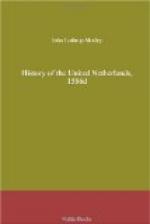Where the Earl hated, his hatred was apt to be deadly, and he was determined, if possible, to have the life of the detested Paul. “You shall see I will do well enough with him, and that shortly,” he said. “I will course him as he was not so this twenty year. I will warrant him hanged and one or two of his fellows, but you must not tell your shirt of this yet;” and when he was congratulating the government on his having at length procured the execution of Captain Hemart, the surrenderer of Grave, he added, pithily, “and you shall hear that Mr. P. B. shall follow.”
Yet the Earl’s real griefs against Buys may be easily summed up. The lewd sinner, nursled in revolutions, had detected the secret policy of the Queen’s government, and was therefore perpetually denouncing the intrigues going on with Spain. He complained that her Majesty was tired of having engaged in the Netherland enterprise; he declared that she would be glad to get fairly out of it; that her reluctance to spend a farthing more in the cause than she was obliged to do was hourly increasing upon her; that she was deceiving and misleading the States-General; and that she was hankering after a peace. He said that the Earl had a secret intention to possess himself of certain towns in Holland, in which case the whole question of peace and war would be in the hands of the Queen, who would also have it thus in her power to reimburse herself at once for all expenses that she had incurred.
It would be difficult to show that there was anything very calumnious in these charges, which, no doubt, Paul was in the habit of making. As to the economical tendencies of her Majesty, sufficient evidence has been given already from Leicester’s private letters. “Rather than spend one hundred pounds,” said Walsingham, “she can be content to be deceived of five thousand.” That she had been concealing from the Staten, from Walsingham, from Leicester, during the whole summer, her secret negotiations with Spain, has also been made apparent. That she was disgusted with the enterprise in which she had embarked, Walsingham, Burghley, Hatton, and all the other statesmen of England, most abundantly testified. Whether Leicester had really an intention to possess himself of certain cities in Holland—a charge made by Paul Buys, and denounced as especially slanderous by the Earl—may better appear from his own private statements.
“This I will do,” he wrote to the Queen, “and I hope not to fail of it, to get into my hands three or four most principal places in North Holland; which will be such a strength and assurance for your Majesty, as you shall see you shall both rule these men and make war or peace as you list, always provided—whatsoever you hear, or is—part not with the Brill; and having these places in your hands, whatsoever should chance to these countries, your Majesty, I will warrant sure enough to make what peace you will in an hour, and to have your debts and charges readily answered.” At a somewhat later moment it will be seen what came of these secret designs. For the present, Leicester was very angry with Paul for daring to suspect him of such treachery.




